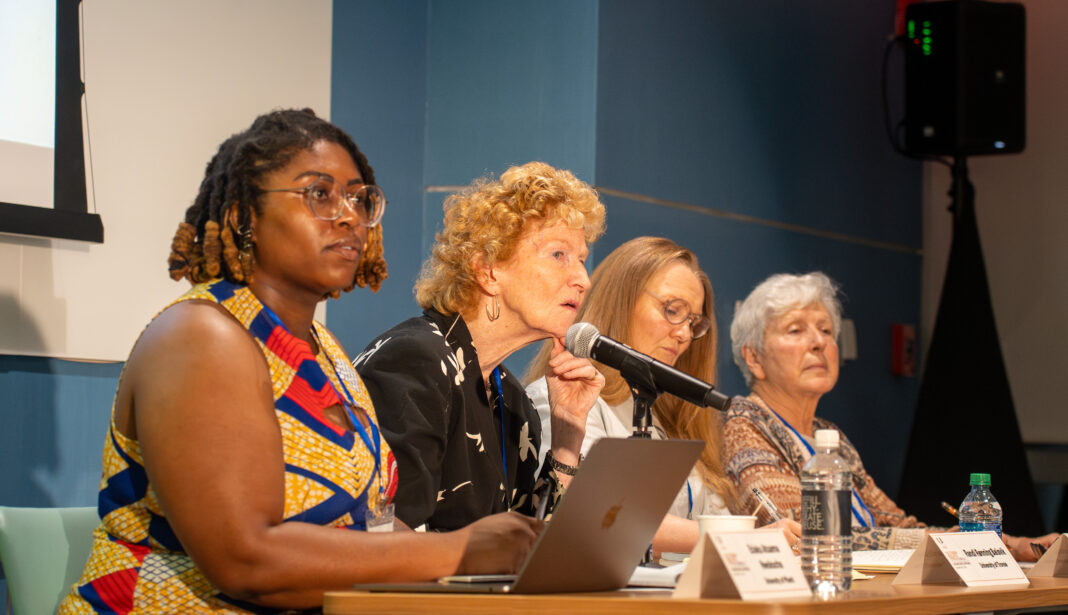
Students and scholars alike met in conversation this past weekend to share research, differing opinions and international perspectives in a reflection of the Ethiopian revolution ahead of its 50-year anniversary in February.
“The Ethiopian Revolution of 1974: 50 Years On” symposium took place Jan. 26 – 27 at the Frost Institute for Chemistry & Molecular Biology, welcoming 20 scholars and upwards of 200 attendees, both traveling or tuning in virtually from the U.S., Ethiopia and all over the globe.
Speakers ranged from local researchers and professors at UM, to international scholars in African academia.
Also in attendance were multiple graduate students in the department of history, all who helped facilitate and organize the conference.
“This is the first international symposium that we’re doing in regards to African history, and we feel that this will allow us to provide more of a space for scholars within this area to present their work and to engage with others in the field,” said Giltrecia Head, a fourth-year Ph.D student who has been a part of the organizing committee.
Bright Petiafo, a native of Ghana and a second-year Ph.D. student in African History studies, also played a role in the organizing committee and is studying under the supervision of Dr. Edmund Abaka alongside Head.
“I thought I knew a little bit about the revolution coming from Africa, but meeting scholars and essentially primary sources on Ethiopia has been a whole new learning experience for me,” Petiafo said.
This was a common takeaway for symposium attendees, as new learning experiences, varying perspectives and engagement with differing research projects defined the conference.
“East African history is a region of research that is fairly new to me, and this has given me a better understanding of the multiple components that are a part of such a prolific time within Ethiopia’s history,” Head said.
The symposium was the creative vision of professor of African history, Etana H. Dinka, and was brought to fruition with the help of the UM College of Arts and Sciences, the Department of History and the Center for Global Black Studies.
“I crafted this project two years ago when I was at James Madison University, and I was well aware that the Ethiopian Revolution will turn 50 years in 2024. I was born and raised in Ethiopia, and lived through the legacies of that revolution,” Dinka said.
The intention of this conference, Dinka shared, was to bring multigenerational scholars in conversation, delving into a number of topics surrounding the revolution and capturing an analysis of what led to, what happened during and what occurred after the Ethiopian revolution of 1974.
“Ethiopia experienced considerable social evolution that overthrew the monarchy and brought to power a military government,” Dinka said. “That put Ethiopia on course for decades of transformation that resulted in state reconfiguration and transformations in the social status of citizens and Ethiopia’s role in the region and globally.”
While the symposium was a celebration of being able to share historical and cultural analysis in conversation with one another, it was also an act of defiance by taking place in Miami, Florida, where book-banning and efforts to erase Black history from public education have swept the sunshine state.
“If we want to teach, we must expose our kids, our society to competing ideas, not by suppression,” said Dinka. “When you suppress historical consciousness, or certain types of historical interpretation, it will find its way to express itself somehow.”
As graduate students, Head and Petiafo echoed this sentiment as they themselves are navigating the ever-changing waters of academia in Florida, despite being able to house a safe space for this conference with UM being a private university.
Head highlighted how this event is meant to be a catalyst for maintaining conversations and engaging fruitfully in preserving and analyzing history, allowing for personal opinions and ideas to be valued.
“For me, when political upheaval happens throughout history, I immediately try to understand the position and location of the U.S. in all of it. This symposium provides an argument to try to override and challenge, in a way, laws that try to push back against us understanding these types of histories,” said Head.
Extending beyond Florida and into countries around the world, volatile political atmospheres and struggles against injustice are in constant motion, with Petiafo emphasizing how the term ‘revolution’ itself continues to strike a nerve.
“The revolution has not ended. The current political happenings in Ethiopia stems from the Ethiopian revolution. We remind ourselves how important the revolution is by having these conversations, and what we learn from it.” Petiafo said.






